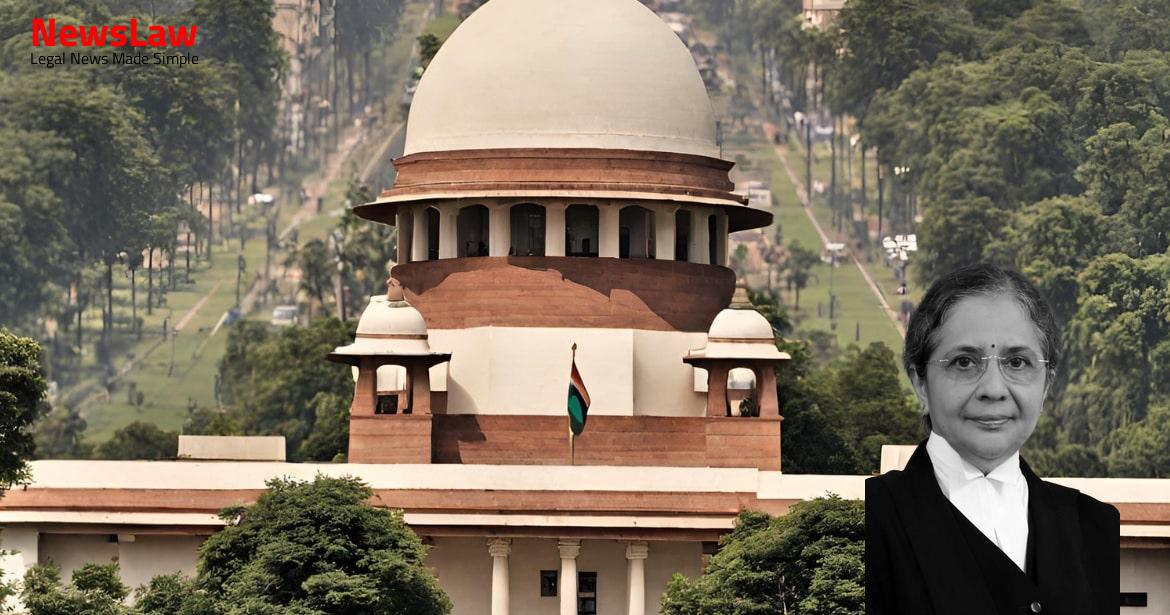In a recent Supreme Court judgement, the case involving Stamp Duty and Penalty imposition on the Agreement of Sale has been settled. The appellant had filed a case for specific performance of the agreement for sale dated 04.11.1996, and also sought to set aside a subsequent sale deed. The Supreme Court’s decision upholds the lower court’s ruling on the matter.
Facts
- The suit agreement is written on stamp papers worth Rs.200/-.
- The appellant filed O.S. No 610 of 2015 for specific performance of the agreement for sale dated 04.11.1996.
- The appellant also prayed to set aside the sale deed dated 13.08.2003, which Original Names executed in favour of another party.
- The appellant claims possession of suit schedule property as part performance under the agreement of sale dated 04.11.1996.
- Article 5(e)(i) of the Schedule of the Act, read with amended Stamp Act No 8 of 1995, prescribes the duty as payable on a conveyance.
- The appellant expressed readiness to pay duty and penalty on the certified copy of the agreement of sale dated 04.11.1996 filed along with the plaint.
- The explanation offered by the appellant is that the agreement is filed in a connected matter between the parties.
- The appellant has not produced the original agreement in O.S. No 610 of 2015.
Also Read: Stamp Duty Dispute: Setting Precedent for District Registrar’s Role
Analysis
- The High Court, in the impugned order, relied on the ratio in Gangappa and another v. Fakkirappa and Digambar Warty and others v. District Registrar, Bangalore Urban District and another.
- The trial court’s order dated 14.08.2015 stated that no discretion is granted to impose a lesser penalty on deficit stamp duty.
- The ruling mentioned ILR 2013 KAR 2099 (DB) – Digambar Warty and others – V/s. District Registrar, Bangalore Urban District and another, where it was held that the Civil Court has the power to impound the document.
- The appellant argued that the deficit stamp duty should alone be collected at the time of passing the judgment and decree, and the levy of penalty is illegal and erroneous.
- The High Court rejected the appellant’s argument through the order impugned in the appeal.
- The appellant’s case is covered by Section 34 of the Act, and rightly ten-times penalty is imposed.
- The quantum of penalty is primarily between the authority/court, and the opposing party has little role to discharge.
- The circumstances in which the decision to pay stamp duty and penalty is rendered are different from the tagged civil appeals.
- The objection under the Stamp Act is no longer available to a contesting party.
- Section 33 of the Act focuses on the examination and impounding of instruments to prevent individuals from withdrawing them when informed about the need to pay proper stamp duty and penalty.
- Individuals intending to rely on insufficiently or improperly stamped instruments can choose to adhere to Section 34 of the Act by paying the required duty and penalty.
- Section 35 of the Act pertains to the admission of instruments in cases where their validity should not be challenged.
- No interference is necessary in the order being challenged.
- The appellant cannot now choose to exercise the option under Section 37(2) of the Act after inviting the court.
- Section 37(1) of the Act applies in the present case.
Also Read: Landmark Judgment on Division of Ancestral Property: Legal Battle Between Family Heirs
Decision
- The Appeals Court has reviewed the arguments presented by the Appellant.
- The court finds that the contentions raised by the Appellant do not justify overturning the previous decision.
- Therefore, the Appeal is dismissed.
- The decision of the lower court stands.
Also Read: Revocation of Power of Attorney: The Case of George vs. Thomas
Case Title: N.M. THEERTHEGOWDA Vs. Y.M. ASHOK KUMAR (2024 INSC 649)
Case Number: C.A. No.-010038-010038 – 2024



